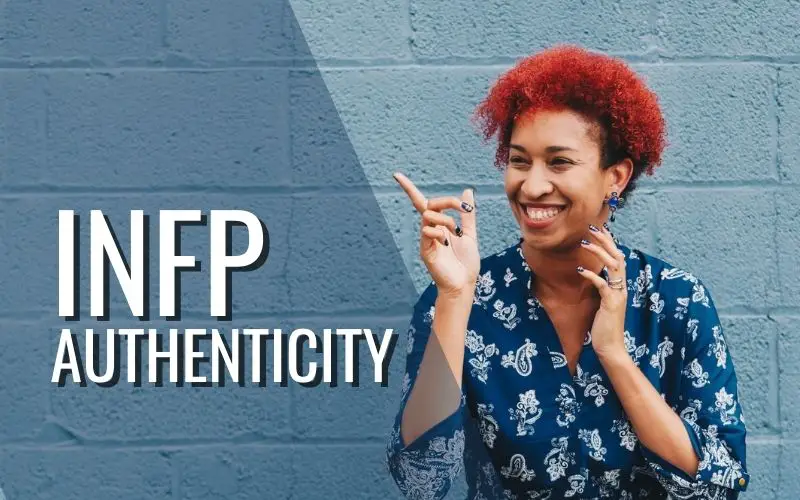If there’s one description I love hearing about INFPs, it’s when people tell us we’re sincere, genuine, and authentic. In a society that values conformity, being authentic is rare, so as an INFP, you bet I am delighted to uphold it as a core value.
Many INFPs are gentle and compassionate, but the truth is, they’re also quiet rebels when pushed too far from their values. They can be stubborn and nonconformists. Unlike other Fe users like INFJ and ISFJ who value group thinking and harmony, an INFP can’t go against the values they uphold dearly.
That’s why you’d notice how INFPs are regarded as irrational and misunderstood. It’s because they are more loyal to their values than submitting to the “norm.” They’re individualistic, and their morals are not easily swayed.
What Is INFP Authenticity?
People mistake authenticity as the ability to say what you truly think, be frank, or be sincere. However, INFP authenticity is different. To INFPs, they have a strong need to be true to themselves, but sorry to say, it doesn’t mean they have to be authentic with others, too.
In this case, INFPs have two sides: they can’t outrightly lie. They’re gentle, honest, and sincere in their words. But on one side, INFPs are also secretive, guarded, and protective of their personal life.
They’re private people who would rather keep things a secret rather than lie. They may tell half-truths, just so no one can pry on what they truly value in life.
When Is An INFP Most Authentic?
INFPs are sincere when they’re in a conversation that doesn’t require them to pretend — situations that don’t involve entertaining relatives or pleasing their workmates and acquaintances.
They’re also thought of as sincere because, as people with strong emotions, you can easily read INFPs’ emotions — like how they look so exhausted at a party they’re stuck in, be childlike over exciting plans, and their never-ending laughs for witty jokes.
The only emotion you almost never see is when they’re sad, offended, or annoyed because they exert extra effort in hiding those negative emotions.
In addition, INFPs don’t give sham compliments and fake promises. They won’t say words that don’t ring true in their hearts. When socializing, they would rather walk away and come off as aloof rather than pretend they’re happy just to entertain the people around them.
Lastly, INFPs are most authentic when they’re with the people they trust. That’s when they become open and even act extroverted. Knowing that their family and friends won’t judge them, an INFP won’t mind saying the weirdest thoughts they have.
When Is An INFP Not Authentic And Sincere?
INFPs can become insincere when a conversation opens up an embarrassing part of their life. INFPs have high regard for their reputation and don’t want to be looked down on. They hide their flaws and personal problems because they dislike looking vulnerable.
What’s more, they fear revealing their truest selves to people, so you may notice INFPs keeping their projects — drawings, stories, and journals — away from people’s reach.
It would suck their energy out when somebody discovers what they do, so they’re always guarded about getting the information about them out.
INFPs are not authentic when they’re in a place where people would judge them. It can be their home with parents who can’t understand them, a classroom, or the office. If people around them are too judgmental, they would rather hide away than open up.
Related Post: 6 Things That Hurt INFP But They Will Never Show To The World
The Power of INFP Authenticity
If you ask me, I think INFP’s greatest trait is authenticity and their idealistic mind, which can lead to a healthy dose of perfectionism.
Tim Burton, a rumored INFP, exemplifies how INFP can shine when they follow what their hearts desire. He’s so detail-oriented and has a clear vision of how he wants his movies to look.
People would be weirded out by how INFPs can obsess over the details. But with such an authenticity overdrive, any project guarantees beauty, artistry, and emotions. That’s simply because INFPs don’t stop working, unless they satisfy their vast, perfected ideals.
When they’re in their zone of interest, creative outputs must pass the high standards of their INFP self before it goes out to the public.
This has been so true for me, too. It takes me days to weeks to finish my creative outputs because I always spot my own flaw. I bet many INFPs had to deal with such perfectionism, too.
When channeled right, it’s powerful. Being true to our idealism leads to INFP’s success.
Authenticity As A Villain to INFPs
On the downside, INFP authenticity can be problematic, too.
Routine job? Ugh. I tap out.
Simply put, INFPs are all-in or all-out kinds of people. No in-between. If they resonate and find meaning in a task, they pour their 200%, even when it means sleepless nights.
But when a task aligns differently from their values, they drop out or become extremely unproductive.
That’s why INFPs need to find a path that caters to their true strengths. Or else they’ll get bored, unfulfilled, and never reach the heights of their true potential.
You may like: The Dark Side of INFP Personality
Conclusion
When it comes to authenticity, INFPs are very good at recognizing what they feel and why they feel it. However, there are times when INFPs may be less authentic than usual—times when they’re unable to express themselves clearly because of fears about what other people think of them.
However, the only thing hindering INFPs’ creativity is fear. Learn to overcome the fear and embrace your authenticity. Who knows how much you can become?
That’s it. I hope this post gave you insights about authenticity. Thanks for reading!
-M.Mathias
You may also like:
INFP job-hopping: How Do You Stop It?
Why Are INFPs Called The Healers?


